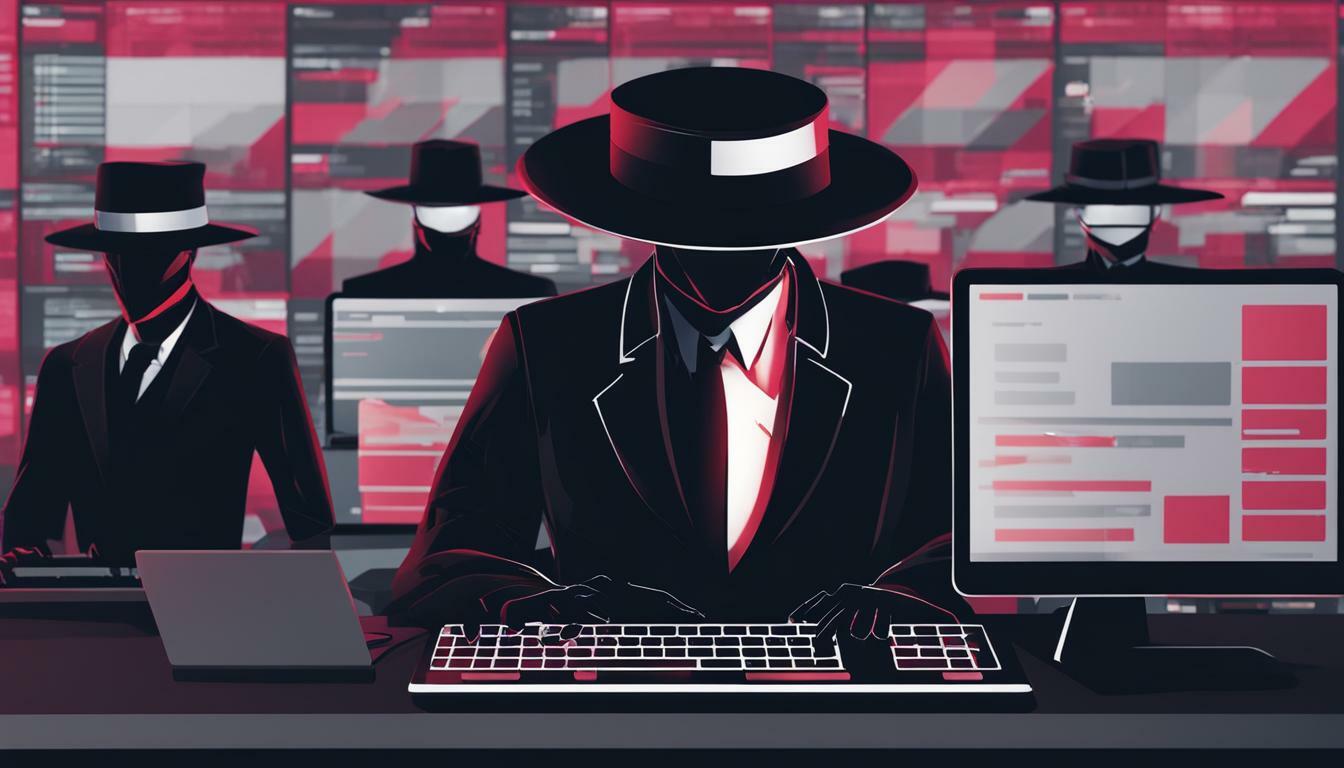In today’s digital age, online security is a growing concern, and many people wonder if using a VPN can protect them from hackers. With cyber threats becoming more sophisticated, it is crucial to understand the capabilities and limitations of a VPN in safeguarding your online activities.
Key Takeaways:
- A VPN can provide protection against certain types of cyberattacks, such as Man-in-the-Middle attacks, remote hacking, and DDoS attacks.
- By encrypting your internet traffic and hiding your IP address, a VPN adds an extra layer of security to your online activities.
- However, a VPN is not a foolproof solution and cannot protect you from malware attacks, phishing attempts, data leaks, software flaws, or human error.
- To enhance your online security, it is important to adopt a multilayered approach that includes antivirus software, password managers, and two-factor authentication.
- When choosing a VPN provider, look for features like a kill switch, secure protocols, and a reliable history to ensure maximum protection.
Understanding VPN Encryption and Hacker Prevention
VPNs utilize advanced encryption techniques to create a secure tunnel between your device and the internet, safeguarding your data from prying eyes and potential hackers. This encryption scrambles your data, making it unreadable to anyone who intercepts it. By routing your internet traffic through remote servers, VPNs also hide your IP address, adding an extra layer of anonymity. This makes it difficult for hackers to trace your online activities back to your device.
One of the key features of a VPN is its ability to prevent man-in-the-middle attacks. In these attacks, hackers intercept the communication between your device and the website you’re visiting, allowing them to eavesdrop on your sensitive information or even alter the content you see. With strong encryption, a VPN ensures that your data remains confidential and tamper-proof, protecting you from these types of attacks.
Another benefit of VPN encryption is its role in preventing remote hacking. By encrypting your data, VPNs make it extremely difficult for hackers to intercept and decipher your communication. This is particularly important when using public Wi-Fi networks, which are notorious for their lack of security. With a VPN, even if hackers manage to breach the network, they won’t be able to access your data.
VPN Encryption and Privacy
Aside from protecting against hackers, VPN encryption also enhances your privacy. With a VPN, your internet service provider (ISP), government agencies, or any other entities monitoring your online activities will only see encrypted data. They won’t be able to track your browsing habits, collect your personal information, or restrict your access to certain websites based on your location. This provides you with a greater level of online privacy and freedom.
Despite the benefits of VPN encryption, it’s important to note its limitations. While VPNs can protect you from certain cyber threats, they cannot safeguard against everything. They cannot prevent malware attacks, phishing attempts, or software vulnerabilities. It is crucial to complement your VPN with other security measures, such as using updated antivirus software, practicing good password hygiene, and enabling two-factor authentication whenever possible.
In conclusion, VPN encryption plays a vital role in protecting your data and online activities from hackers. It provides a secure tunnel for your internet traffic, making it unreadable to potential attackers. However, it’s essential to understand its limitations and adopt a multilayered approach to online security to stay fully protected.
The Limitations of VPNs in Cybersecurity
While VPNs can provide a significant boost to your online security, it’s important to note that they are not a silver bullet solution and cannot protect you from all types of cyber threats. A VPN can offer protection against certain types of attacks by encrypting your internet traffic and hiding your IP address. This helps safeguard against Man-in-the-Middle attacks, remote hacking, and DDoS attacks. However, it is crucial to understand the limitations of VPNs in cybersecurity.
A VPN is unable to shield you from malware attacks, phishing attempts, data leaks, software flaws, or human error. These threats can still compromise your online security, even when using a VPN. While the encrypted tunnel created by a VPN adds an extra layer of protection, it does not guarantee complete immunity from all cyber threats.
It is essential to adopt a multilayered approach to online security. Alongside using a VPN, it is recommended to install reliable antivirus software, which can detect and prevent malware infections. Password managers, which generate strong and unique passwords, and two-factor authentication are also crucial for enhancing your online security.
When selecting a VPN provider, consider features such as a kill switch, which cuts off your internet connection if the VPN connection drops, ensuring your sensitive data remains protected. Secure protocols, such as OpenVPN or IKEv2, provide an extra layer of encryption. Additionally, researching a provider’s history and reputation can help ensure you choose a reliable and trustworthy VPN service.
| Do | Don’t |
|---|---|
| Keep software updated | Click on suspicious links or download unknown files |
| Enable firewalls | Share personal information on insecure websites |
| Use caution when connecting to public Wi-Fi networks | Use weak or easily guessable passwords |
It’s worth noting that private browsing alone does not protect you from hackers. While a VPN can enhance your online security, it is not a guarantee of complete protection. By understanding the limitations and complementing a VPN with other security measures, you can create a robust defense against cyber threats.
Multilayered Approach to Online Security
To ensure comprehensive protection against hackers and cyber attacks, it is crucial to adopt a multilayered approach to online security that includes more than just a VPN. While a VPN can provide a certain level of protection, it is not a foolproof solution. It is important to be aware of its limitations and supplement it with other security measures.
One of the key components of a multilayered approach is using reliable antivirus software. This will help detect and remove any malware that may enter your system, offering an additional layer of defense against cyber threats. Password managers are also essential to ensure strong and unique passwords for all your online accounts, reducing the risk of unauthorized access.
| Key Components of a Multilayered Approach to Online Security: |
|---|
| Antivirus software: Protects against malware and other malicious programs. |
| Password managers: Help create and manage strong, unique passwords. |
| Two-factor authentication: Adds an extra layer of security by requiring a second verification step. |
| Firewalls: Prevent unauthorized access and monitor network traffic. |
Additionally, enabling two-factor authentication can greatly enhance your online security. This feature adds an extra layer of protection by requiring a second verification step, such as a code sent to your mobile device, when logging into your accounts.
Firewalls also play a crucial role in a multilayered approach. They act as a barrier between your devices and the internet, preventing unauthorized access and monitoring network traffic for any suspicious activity. Make sure to enable firewalls on all your devices for maximum protection.
Lastly, exercising caution when connecting to public Wi-Fi networks is essential. Public Wi-Fi networks are often unsecured, making it easier for hackers to intercept your data. It is advisable to avoid conducting sensitive transactions or accessing confidential information while connected to these networks.
Summary
- A VPN provides protection against certain types of cyberattacks but is not foolproof.
- Adopting a multilayered approach to online security is crucial.
- Supplementing a VPN with antivirus software, password managers, and two-factor authentication enhances protection.
- Enabling firewalls and exercising caution on public Wi-Fi networks are additional security measures to consider.
| Key Takeaways | |
|---|---|
| A VPN: | Provides protection against specific cyberattacks. |
| A multilayered approach: | Includes antivirus software, password managers, two-factor authentication, and firewalls. |
| Caution: | Avoid sensitive transactions on public Wi-Fi networks. |
Choosing a Reliable VPN Provider
Not all VPN providers are created equal, so it’s important to choose a reliable and reputable provider that prioritizes your online security. A VPN can offer protection against certain types of cyberattacks, such as Man-in-the-Middle attacks, remote hacking, and DDoS attacks. By encrypting your internet traffic and hiding your IP address, a VPN ensures that your data is secure and your online activities remain private.
When selecting a VPN provider, there are several factors to consider. First, look for a provider that offers a kill switch feature. This feature automatically disconnects your internet connection if the VPN connection drops, preventing any unprotected data from being transmitted. Additionally, choose a provider that utilizes secure protocols like OpenVPN or IKEv2, which offer strong encryption and data integrity.
It’s also important to consider the provider’s history and reputation. Look for providers that have a proven track record of protecting user data and respecting privacy. Check if the provider has undergone independent security audits or has received certifications from trusted organizations. Reading reviews and checking user ratings can also give you insights into the reliability and performance of different VPN providers.
| Features to Look for in a Reliable VPN Provider |
|---|
| Advanced encryption protocols |
| Wide range of server locations |
| No-logs policy |
| Fast and stable connections |
| 24/7 customer support |
Remember, while a VPN can enhance your online security, it is not a guarantee of complete protection. A VPN cannot protect you from malware attacks, phishing attempts, data leaks, or vulnerabilities in software. It is crucial to adopt a multilayered approach to online security by combining a VPN with other measures, such as using antivirus software, regularly updating your software, and practicing safe browsing habits. Always exercise caution when connecting to public Wi-Fi networks and avoid sharing sensitive information over unsecured connections.
Best Practices for Enhanced Online Security
In addition to using a VPN, there are several best practices that you should follow to further strengthen your online security and protect yourself from hackers. While a VPN can provide a layer of protection, it’s important to be proactive in safeguarding your digital presence. By implementing these best practices, you can create a more secure online environment.
1. Keep your software updated
Regularly updating your operating system, antivirus software, and other applications is crucial for maintaining a secure online experience. Software updates often include security patches that address vulnerabilities that hackers may exploit. Enable automatic updates whenever possible to ensure that you have the latest security measures in place.
2. Enable firewalls
Firewalls act as a barrier between your computer and the internet, monitoring incoming and outgoing traffic to block potentially malicious connections. Make sure to enable the built-in firewall on your device and consider using a hardware firewall for added protection. Firewalls add an extra layer of defense against unauthorized access and can help prevent cyberattacks.
3. Use caution when connecting to public Wi-Fi networks
Public Wi-Fi networks are often unsecured, making it easier for hackers to intercept your data. Avoid accessing sensitive information, such as banking or email accounts, while connected to public Wi-Fi. If you must use public Wi-Fi, consider using a virtual private network (VPN) to encrypt your traffic and protect your data from prying eyes.
4. Practice good password hygiene
Creating strong, unique passwords for each of your online accounts is essential. Avoid using easily guessable passwords and consider using a password manager to securely store and generate complex passwords. Enable two-factor authentication whenever possible to add an extra layer of security to your accounts.
By implementing these best practices, you can significantly enhance your online security and minimize the risk of falling victim to cyberattacks. Remember, while a VPN can provide an added layer of protection, it’s important to take a holistic approach to cybersecurity and remain vigilant in protecting your personal data.
Recognizing the Limitations of VPNs
It’s important to recognize that while VPNs bolster your online security, they are not a fail-safe solution and cannot provide absolute protection against hackers. While a VPN can safeguard against certain types of cyberattacks, it is crucial to understand its limitations in order to maintain a proactive approach to online security.
Firstly, a VPN can encrypt your internet traffic and hide your IP address, protecting you from Man-in-the-Middle attacks, remote hacking, and DDoS attacks. This is achieved by routing your connection through a secure server, creating a private tunnel for your data. However, it’s important to note that a VPN cannot protect you from malware attacks or phishing attempts. These threats can still infiltrate your system through malicious links or attachments, even if you are using a VPN.
Moreover, a VPN cannot shield you from software flaws or human error. Vulnerabilities in operating systems or applications can still leave you exposed to potential cyber threats. Similarly, if you unknowingly disclose sensitive information or fall victim to a social engineering scam, a VPN cannot prevent the consequences of such actions.
| VPN Protection | Limitations |
|---|---|
| Encrypts internet traffic | Cannot protect against malware attacks or phishing attempts |
| Hides IP address | Does not shield against software flaws or human error |
| Protects against Man-in-the-Middle attacks, remote hacking, and DDoS attacks | Cannot guarantee absolute protection |
Therefore, it is essential to adopt a multilayered approach to online security. Alongside using a VPN, it is recommended to have reliable antivirus software installed, utilize password managers to safeguard your credentials, and enable two-factor authentication wherever possible. Regularly updating your software and enabling firewalls can also add an extra layer of protection against potential threats.
In conclusion, while a VPN can enhance your online security by encrypting your internet traffic and hiding your IP address, it is not a guarantee of complete protection. Being aware of the limitations of VPNs and implementing additional security measures will help ensure a more comprehensive defense against hackers and cyber threats.
Why Private Browsing Alone Isn’t Enough
Many people mistakenly believe that private browsing mode is sufficient to protect them from hackers, but the reality is that it offers limited security benefits compared to using a VPN. While private browsing can prevent your browsing history from being stored on your device, it does not encrypt your internet traffic or hide your IP address, making you vulnerable to cyberattacks.
Using a VPN, on the other hand, provides an extra layer of protection against hackers. A VPN encrypts your internet traffic, making it unreadable to anyone attempting to intercept it. This ensures that even if a hacker manages to access your data, they won’t be able to decipher it. Furthermore, a VPN masks your IP address, making it difficult for hackers to track your online activities or launch targeted attacks. It’s like wearing an invisibility cloak while browsing the internet.
However, it is important to note that a VPN is not a foolproof solution to all cybersecurity threats. While it can safeguard against certain types of cyberattacks, such as Man-in-the-Middle attacks and remote hacking, it cannot protect you from other forms of malware attacks, phishing attempts, data leaks, software flaws, or human error. Therefore, it is crucial to adopt a multilayered approach to online security.
The Importance of Multilayered Security
To ensure comprehensive protection against cyber threats, it is recommended to combine the use of a VPN with other security measures. Here are some additional steps you can take:
- Install reliable antivirus software and keep it up to date. This will help detect and remove malware from your device.
- Use a password manager to create strong and unique passwords for all your online accounts. This reduces the risk of password breaches.
- Enable two-factor authentication whenever possible. This adds an extra layer of security by requiring a second form of verification to access your accounts.
- Keep your software and operating systems updated. Software updates often include security patches that fix vulnerabilities.
- Enable firewalls on your devices. Firewalls act as a barrier between your device and the internet, blocking unauthorized access.
- Exercise caution when connecting to public Wi-Fi networks. Avoid accessing sensitive information or making financial transactions on unsecured networks.
By following these best practices and combining them with a reliable VPN, you can significantly enhance your online security and protect yourself from a wide range of cyber threats.
| VPN Benefits | Private Browsing Limitations |
|---|---|
| Encrypts internet traffic | Does not encrypt internet traffic |
| Masks your IP address | Does not hide your IP address |
| Protects against Man-in-the-Middle attacks | Does not protect against Man-in-the-Middle attacks |
| Safeguards against remote hacking | Does not safeguard against remote hacking |
| Can be used on multiple devices | Private browsing is limited to individual devices |
Understanding the Role of VPNs in Cybersecurity
VPNs play a crucial role in enhancing cybersecurity by encrypting your internet traffic, hiding your IP address, and providing a secure connection between your device and the internet. With the increasing number of cyber threats and data breaches, it has become essential to take proactive measures to protect our online privacy and security. A VPN acts as a shield, creating a secure tunnel that protects your sensitive information from prying eyes.
When you connect to the internet through a VPN, your data is encrypted, making it nearly impossible for hackers to intercept and decipher. By encrypting your internet traffic, VPNs ensure that your online activities, such as browsing, streaming, and file sharing, remain private and secure. They also help protect against Man-in-the-Middle attacks and remote hacking attempts, as your data is securely transmitted through the VPN server.
However, it is important to note that while VPNs provide a layer of protection, they are not a one-size-fits-all solution for cybersecurity. They cannot shield you from all potential threats, such as malware attacks, phishing attempts, or human error. Cybercriminals are continuously evolving their tactics, and it is crucial to be aware of the limitations of VPNs. It is recommended to adopt a multilayered approach to online security, combining a VPN with other security measures.
| Key Takeaways: |
|---|
| • VPNs encrypt your internet traffic, hiding it from hackers and ensuring your online activities remain private. |
| • They protect against Man-in-the-Middle attacks, remote hacking, and provide a secure connection. |
| • However, VPNs are not foolproof and cannot protect against all cybersecurity threats. |
| • Adopting a multilayered approach to online security is recommended, including antivirus software, password managers, and two-factor authentication. |
When selecting a VPN provider, it is essential to consider certain factors. Look for features like a kill switch, which stops internet traffic if the VPN connection is lost, secure protocols such as OpenVPN or WireGuard, and a reputable history of protecting user data. Additionally, ensuring that your software is regularly updated, enabling firewalls, and exercising caution when connecting to public Wi-Fi networks are essential steps in maintaining online security.
While VPNs cannot guarantee complete protection, they are an important tool in safeguarding your privacy and securing your online activities. By understanding the role of VPNs in cybersecurity and adopting a comprehensive approach to online security, you can significantly reduce the risk of falling victim to cyberattacks and data breaches.
The Need for Ongoing Vigilance in Online Security
While using a VPN is an important step in protecting yourself from hackers, it is crucial to remain vigilant and actively take steps to enhance your online security. A VPN can provide protection against certain types of cyberattacks by encrypting your internet traffic and hiding your IP address. This safeguards against Man-in-the-Middle attacks, remote hacking, and DDoS attacks. However, it is important to recognize the limitations of VPNs and understand that they are not a foolproof solution.
A VPN alone cannot protect you from various other threats such as malware attacks, phishing attacks, data leaks, software flaws, or human error. To ensure comprehensive protection, it is recommended to adopt a multilayered approach to online security. This involves combining the use of a VPN with other security measures such as antivirus software, password managers, and two-factor authentication.
When choosing a VPN provider, it is essential to select one that offers advanced features to enhance your security. Look for providers that offer a kill switch, which automatically disconnects your internet if the VPN connection drops, preventing your data from being exposed. Secure protocols such as OpenVPN and WireGuard are also important to ensure the integrity of your encrypted connection. Additionally, consider the provider’s reputation and history to ensure reliability.
Furthermore, it is crucial to keep your software updated and enable firewalls on your devices. Regularly updating your operating system and applications helps protect against known vulnerabilities that hackers may exploit. Be cautious when connecting to public Wi-Fi networks, as they can be a breeding ground for cybercriminals. Always use a VPN when accessing public Wi-Fi to encrypt your data and maintain your privacy.
In conclusion, while a VPN can enhance your online security by protecting you from certain types of cyberattacks, it is not a guarantee of complete protection. It is important to remain vigilant, stay informed about emerging threats, and consistently implement best practices for online security. By taking an active approach to protecting your digital presence and combining multiple security measures, you can greatly reduce the risk of falling victim to hackers and other cyber threats.
The Critical Impact of VPNs on Cybersecurity
VPNs have a critical impact on cybersecurity by encrypting your internet traffic, masking your IP address, and shielding you from specific types of cyber threats. By utilizing a VPN, you can enhance your online security and protect yourself from potential hackers.
One of the key features of a VPN is its ability to encrypt your internet traffic. This means that any data you send or receive is scrambled and unreadable to anyone who may be trying to intercept it. With this encryption, your sensitive information, such as passwords, credit card details, and personal messages, are kept safe from prying eyes.
In addition to encrypting your data, a VPN also masks your IP address. Your IP address is a unique identifier that can reveal your location and online activities. By hiding your IP address, a VPN ensures that your online presence remains anonymous, making it difficult for hackers to track your online activities and launch targeted attacks against you.
While a VPN provides protection against certain types of cyber threats, it is important to note its limitations. While it can safeguard against Man-in-the-Middle attacks, remote hacking, and DDoS attacks, it cannot protect you from all forms of cyberattacks. It is crucial to incorporate a multilayered approach to your online security by using other tools such as antivirus software, password managers, and two-factor authentication.
| Pros |
|
|---|---|
| Cons |
|
When choosing a VPN provider, it is essential to consider certain factors. Look for a provider that offers features like a kill switch, which disconnects your internet if the VPN connection drops, ensuring your data remains secure. Secure protocols such as OpenVPN and IKEv2 are also important to ensure a strong and reliable connection. Additionally, research the provider’s track record and reputation to ensure they have a history of protecting user privacy and security.
In conclusion, while a VPN can enhance your online security by encrypting your internet traffic and masking your IP address, it is not a foolproof solution. It is crucial to adopt a multilayered approach to online security and use other tools in conjunction with a VPN. By staying vigilant, keeping your software updated, and following best practices, you can significantly reduce the risk of falling victim to cyberattacks.
Conclusion
In conclusion, while VPNs can enhance your online security and protect you from certain types of cyber threats, they are not a foolproof solution and should be combined with other security measures for comprehensive protection against hackers.
A VPN provides essential encryption and hides your IP address, shielding you from Man-in-the-Middle attacks, remote hacking, and DDoS attacks. It creates a secure tunnel for your internet traffic, ensuring that your data remains private and secure. However, it is important to note that a VPN cannot protect you from all forms of cyber threats.
Hackers are constantly evolving their techniques, employing tactics such as malware attacks, phishing attacks, data leaks, software flaws, and human error. These threats can bypass a VPN’s protection. Therefore, it is crucial to adopt a multilayered approach to online security.
By using a combination of security measures, such as antivirus software, password managers, two-factor authentication, and a VPN, you create multiple barriers against potential attacks. Regularly updating your software, enabling firewalls, and exercising caution when accessing public Wi-Fi networks are additional precautions that should not be overlooked.
Private browsing, often mistaken for a VPN, does not protect you from hackers. While private browsing may prevent your browsing history from being stored on your device, it does not encrypt your internet traffic or hide your IP address. Thus, it is insufficient to rely solely on private browsing for online security.
Remember, while a VPN is a valuable tool for enhancing your online security, it is not a guarantee of complete protection. By combining a VPN with other security measures and practicing ongoing vigilance, you can significantly reduce the risk of falling victim to cyberattacks and maintain a safer online presence.
FAQ
Q: Does a VPN protect you from hackers?
A: A VPN can provide protection against certain types of cyberattacks, such as Man-in-the-Middle attacks, remote hacking, and DDoS attacks. It encrypts your internet traffic and hides your IP address, making it harder for hackers to intercept your data. However, it cannot protect you from malware attacks, phishing attacks, data leaks, software flaws, or human error.
Q: Can private browsing protect you from hackers?
A: No, private browsing alone is not enough to protect you from hackers. While it helps prevent your browsing history from being stored on your device, it does not encrypt your internet traffic or hide your IP address. To enhance your online security, it is recommended to use a VPN along with other security measures, such as antivirus software, password managers, and two-factor authentication.
Q: How can I enhance my online security with a VPN?
A: To enhance your online security with a VPN, follow these best practices: choose a reliable VPN provider with features like a kill switch and secure protocols, keep your software updated, enable firewalls, use caution when connecting to public Wi-Fi networks, and use a multilayered approach to online security by combining a VPN with other security measures.
Q: What should I look for when choosing a VPN provider?
A: When choosing a VPN provider, look for features like a kill switch, secure protocols (such as OpenVPN or IKEv2), a reliable history with no data breaches, and a clear privacy policy. Consider factors like server locations, connection speed, and customer support. It’s also important to read reviews and compare different providers to find one that meets your specific needs.
Q: Can a VPN guarantee complete protection?
A: While a VPN can enhance your online security, it is not a guarantee of complete protection. It can protect against certain types of cyberattacks, but it cannot protect you from all threats. It’s important to use a multilayered approach to online security and stay vigilant by keeping your software updated, using strong passwords, and being cautious of suspicious emails or websites.








